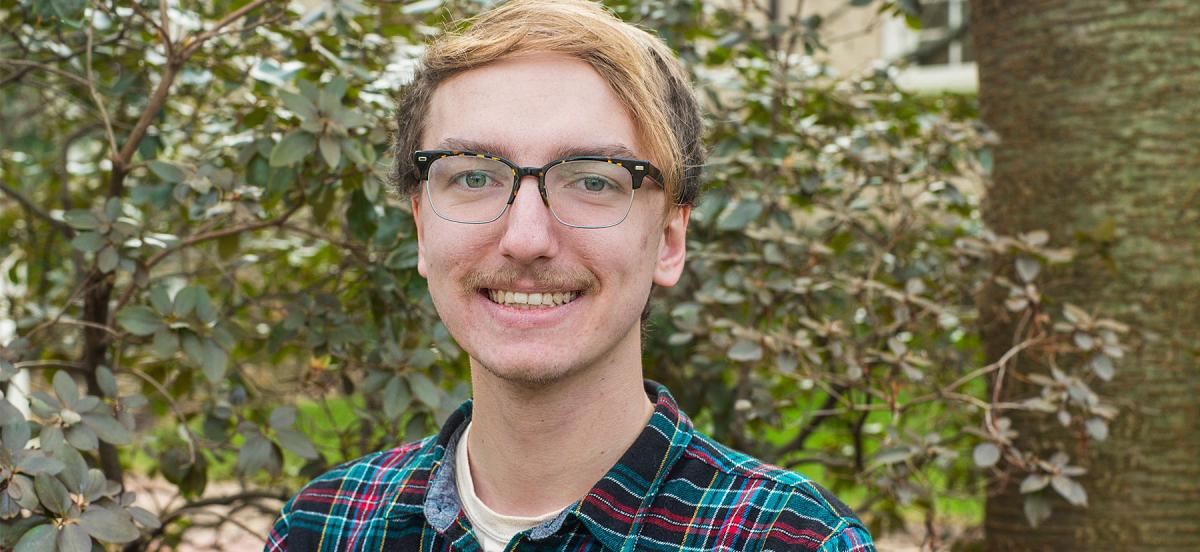Richard Phillips '18 Wins Computing Research Association Award

Richard Phillips '18. Photo by Patrick Montero.
Details
The computer science major is the only one of the four winners of the 2018 Outstanding Undergraduate Researchers Award from a liberal arts college.
The body of research that Richard Phillips '18 has amassed while at Haverford College has earned the computer science major from Bordentown, NJ, the 2018 Computer Research Association's Outstanding Undergraduate Researchers Award. Phillips was one of four undergraduates honored with the prize and the only one from a liberal arts college.
"The CRA Outstanding Undergraduate Researcher Award is the main award recognizing outstanding undergraduate research in computer science," said Assistant Professor of Computer Science Sorelle Friedler, whose lab has been home to much of Phillips' work. "Departments from North American universities nominate a limited number of students and only four students win the award every year. It's a great honor for Richard to have been chosen."
The award recognizes not only his machine learning research conducted with Friedler over the past year and a half, but also cheminformatics work done in Associate Professor of Chemistry Joshua Schrier's lab before then. Some of this work is part of the Dark Reactions Project, a collaboration between Friedler, Schrier, and Associate Professor of Chemistry Alexander Norquist that mines failed experiments to create a machine learning algorithm that can predict new synthetic materials reactions.
"[My] work started when I received funding from the Arnold & Mabel Beckman Foundation to apply active learning strategies to the Dark Reaction Project at Haverford," said Phillips, who is not only a Haverford College Beckman Scholar but also a Chesick Scholar. "This basically means that I was studying ways to figure out what reactions should be performed to build the best model possible for predicting the outcome of reactions."
"One of his recent projects focuses on automatically creating human-interpretable explanations of recommendations," said Friedler. "For the Dark Reactions Project, we suggest experiments that we think would be interesting to chemists and which would also improve the machine learning model we are using. Asking chemists to perform an experiment in the lab is an investment of their time and resources, so Richard, with alum Kyu Hyun Chang '17, worked to provide explanations with these suggestions, so that the chemists could know why we're recommending an experiment and what we hope to learn."
The axis on which all of Phillips' research turns is the desire to solve machine learning problems by building good representations of problem spaces rather than trying to gather the most data possible.
"My intuition is that the largest advances that we have in our lifetimes are going to come from making use of this ‘unlabeled’ data, rather than trying to work very hard curating the best data for a single problem and throwing the majority of everything you could use away," he said. "Towards this, my work in active learning was one strategy for minimizing how much labeled data was necessary."
The CRA Outstanding Undergraduate Researcher Award will fund Phillips' attendance at a research conference of his choosing. (He has already presented his research at one conference in Sydney, Australia, thanks to Beckman and KINSC funding.) And he is grateful for not just the opportunity, but also for the recognition.
"It is often hard to know if you’re developing a worthwhile line of inquiry in your research, so outside validation saying our work is tackling important problems is super valuable," he said.
Phillips is likewise thankful for the Haverford faculty mentors who have helped guide his work, and taught him how to be a researcher. But in addition to Friedler and Schrier, he credits one teacher outside his area of study—and one program, in particular—for helping him reach his potential during his college career.
"Much of the success and friendship I’ve found at Haverford I think I have to attribute to [Senior Lecturer of Mathematics and Statistics] Jeffrey Tecosky-Feldman and the Chesick Scholars Program," he said. "As a Chesick scholar, I really felt like I had a cohort of supportive friends, I was prepared for Haverford, and I had the resources so that money issues didn’t need to affect studying. I hope that I can testify that these resources really have made all the difference in opening up opportunities that wouldn’t have otherwise been accessible to me."
Read more about Fords who have won fellowships, scholarships, or grants.



